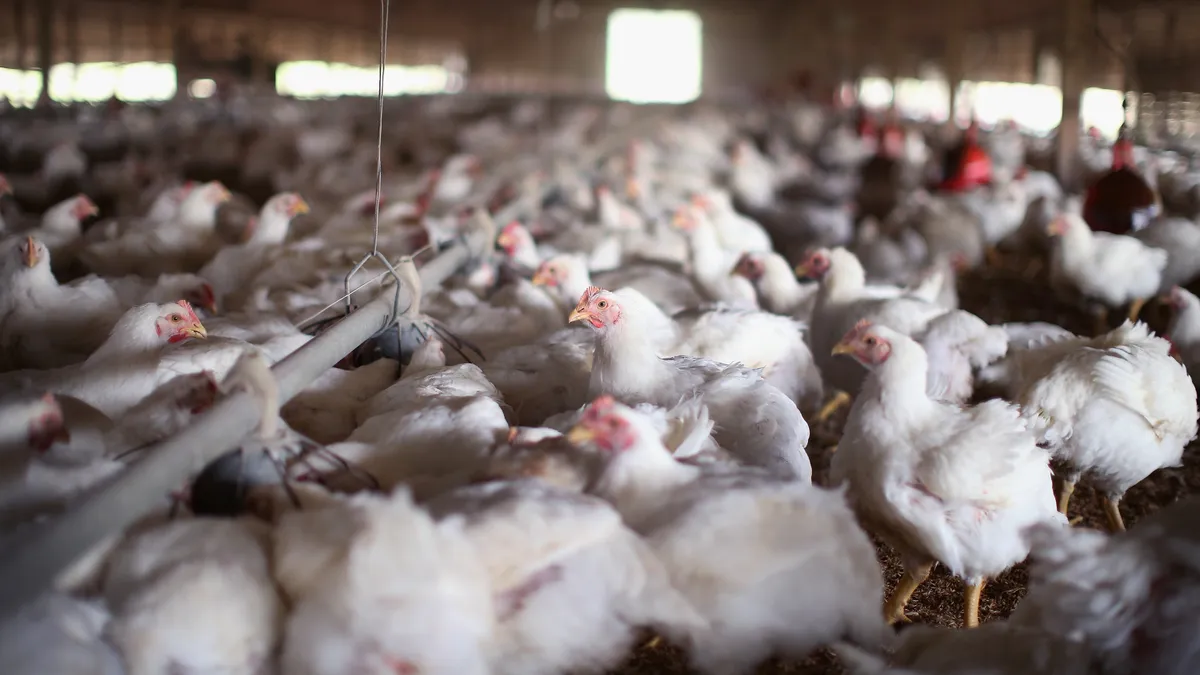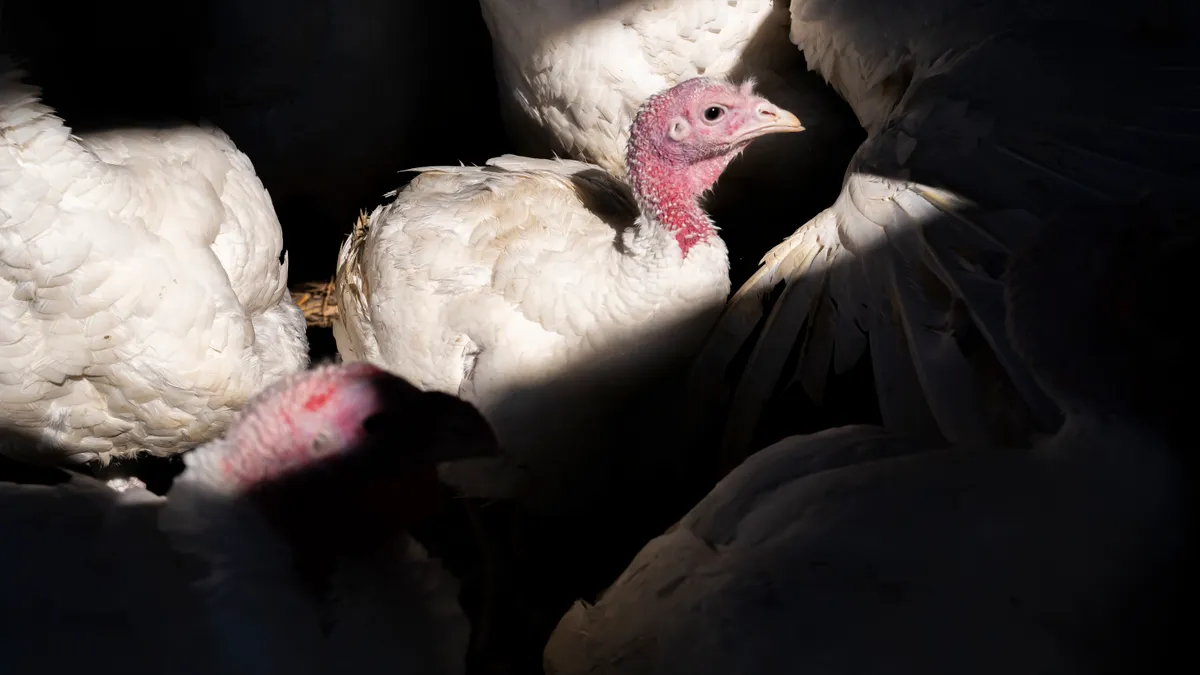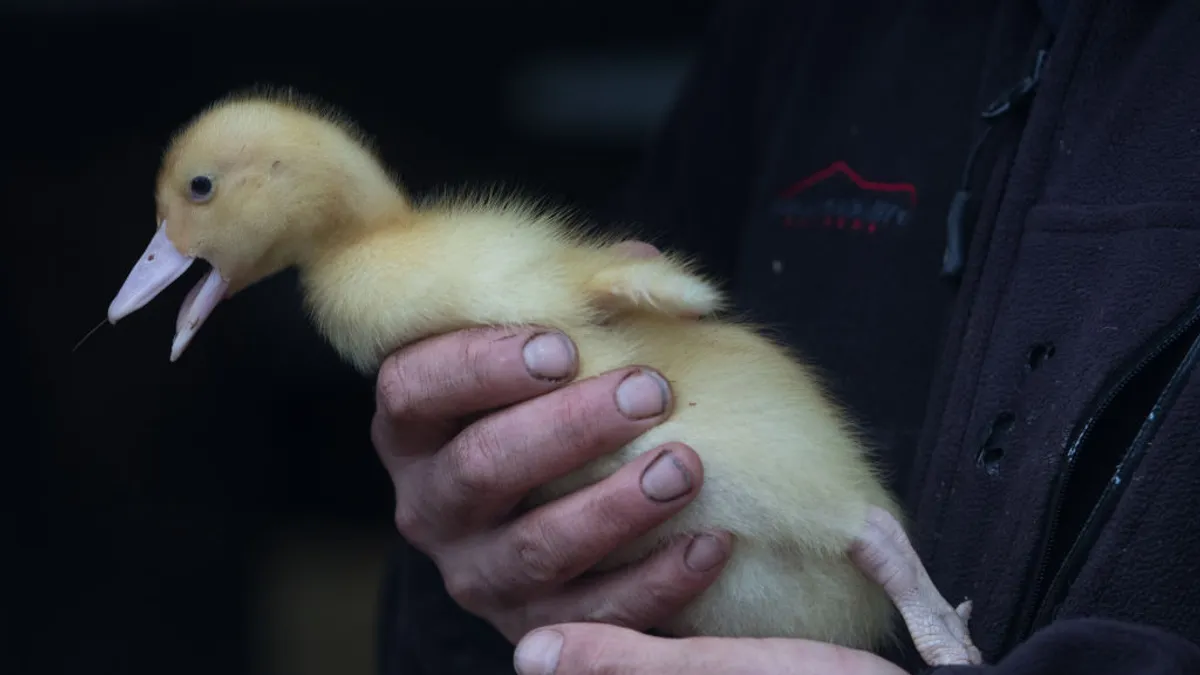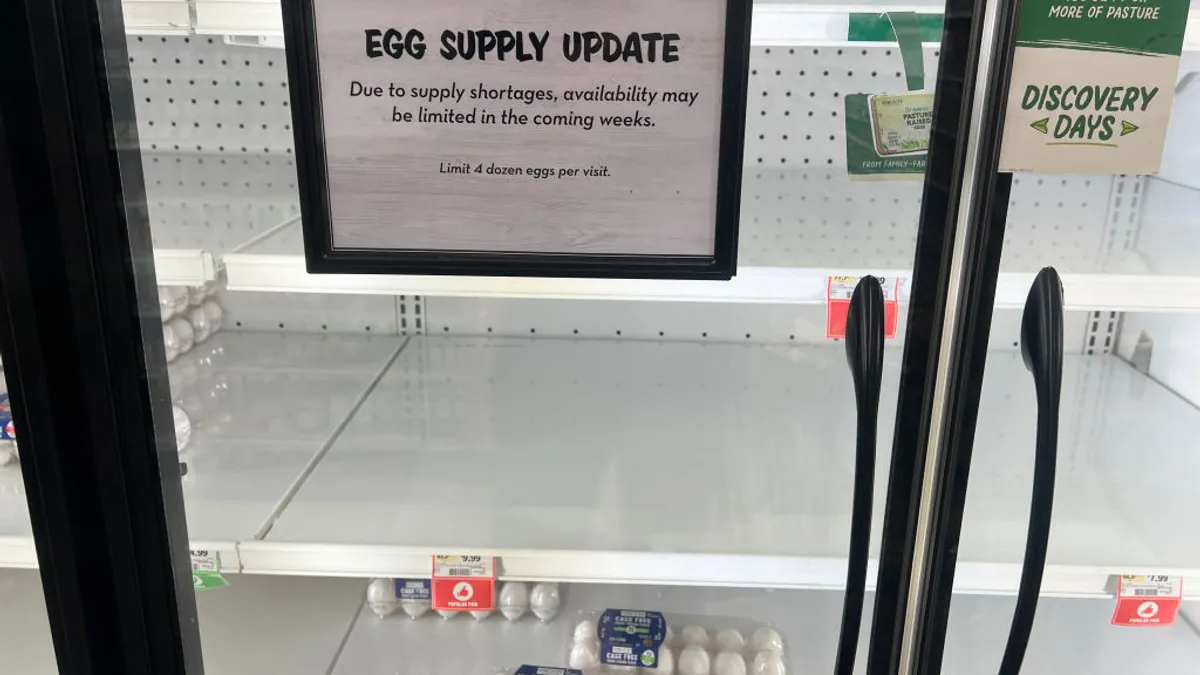Editor’s note: This is part one of a series on what happened when Cooks Venture suddenly ceased operations in Arkansas. Click here for part two.
Cooks Venture was supposed to be a difference maker in the chicken industry.
Instead of the typical bird raised, slaughtered and sold for the masses at grocery stores, the company contracted farmers, also known as growers, to care for a special heritage breed that had access to outdoors and grew at a slower rate. Some consumers believe these changes improve the animal welfare and its taste, according to a study.
The Arkansas-based company, initially founded in 2019 by Matthew Wadiak, the former chief operating officer at Blue Apron, launched with a focus on regenerative agriculture and touted practices to combat climate change. The company paid growers more for raising a premium product.
Cooks Venture chicken sold for about $5 per pound, more than double the typical grocery store prices. Despite the high price tag, customer reviews were glowing, with one Reddit user saying there was never a “woody or poor quality breast” in their years of purchasing the chicken. Another reviewer touted Cooks as “by far the best” on the market, according to the company’s website.
By 2022, Cooks secured $50 million in funding to expand its poultry genetics program and operations infrastructure. As early as last summer, the company was taking on new chicken growers.
One of these new recruits was Dustin Maybee, a former construction worker from Green Forest, Ark. He told Agriculture Dive he didn’t know much about Cooks before joining but liked the idea of raising free-range chickens. Becoming a farmer was important to him as it meant more time with family and less travel for work.
“Everything was going good,” Maybee said. Then he received the letter.
In November, Cooks notified Maybee and other growers that it was experiencing a “financial difficulty” and would close by the end of the month if it couldn’t find an investor or adequate funding.
“If this happens, we are committed to winding down the company responsibly. All outstanding fees for services already rendered will be paid as part of this process,” Blake Evans, executive vice president of the company, wrote in the letter dated Nov. 17.
Soon reports of production layoffs emerged and growers began raising questions about the hordes of chickens on their land: Would this flock get picked up for processing? If not, what would happen? What about utility bills and mortgages? Would the birds starve once the feed and water ran dry? Is there another processor available to help?
Arkansas state Sen. Bryan King, a long-time poultry grower, thought the state should step in and offer financial support to impacted farmers. He sought for an emergency declaration, raising animal welfare, disease and environmental concerns.
But the governor’s office declined King’s request stating that “the proper role of government does not include state assumption of private debts,” according to a letter dated Dec. 8 from Arkansas Secretary of Agriculture Wes Ward.
Even though the state dismissed helping the growers financially, the Arkansas Department of Agriculture’s Livestock and Poultry Commission assisted Cooks in the aftermath of the closure. The agency sent field workers to affected farms to smother the birds with foam to address animal welfare and disease concerns.
The deal was for the state to euthanize the birds and Cooks to handle the disposal and cleanup. This agreement led to a series of missteps and miscommunication that resulted in more than 1 million dead chickens across Northwest Arkansas and several upset, financially stressed poultry growers, who felt they were on the hook for cleaning Cooks’ mess.
Poor communication
The day before Thanksgiving, the livestock commission got a call from Cooks about the closure and what that meant for the state’s poultry growers.
The commission “bent over backwards” through the break working nights and weekends, trying to help and answer questions from legislators and the public to the best of its ability, Ward said in testimony at a joint agriculture committee hearing on Feb. 9. But three growers in attendance countered this, saying communication from Cooks and the state was rather poor through the process.
Cooks, which was not present at the meeting, ignored multiple requests for comment from Agriculture Dive.
“There was never any indication that they were going under,” testified Leslie Harp, a former poultry grower from Clifty, Ark. “An hour and a half after they brought me birds, they told me they were closing the company down.”
On Nov. 17, Cooks brought Harp enough chickens to fill more than two houses around 5:30 p.m. She was scheduled to get birds for three more houses the following week. In her testimony, Harp said she unloaded the last batch around 7:30 p.m. and received a call from a production manager that she would not get any more birds.
The state eventually called Harp with plans to foam her chickens. Five cases of highly pathogenic avian influenza, also known as bird flu, have been detected in Arkansas since Halloween and her farm was near another farm that tested positive for the disease, according to the livestock commission. However, she refuted these claims.
“I was not in an [avian influenza] zone,” Harp said. “I was in Madison County. AI was present in Carroll County at that time, not Madison County. I’m 35 miles away from the Carroll County line.”
The birds were about 13 days old and the grower had plenty of feed in storage to keep them fed — 144,000 pounds worth — when the field workers arrived with trucks and equipment.
Harp said she got a 12-hour notice beforehand. “I had 72,000 birds on my farm the day they came.”
Once the euthanizing foam had settled, the birds remained untouched for 11 days. Harp said she was told that Cooks would help with the cleanup. She made phone calls, but no one answered and no one came. An overwhelming stench lingered by the houses.
And so Harp and her husband got to work covering the dead, rotten chickens so they could decompose properly.
The rise and fall of Cooks
During the company’s launch in 2019, Cooks marketed itself as a next-generation food company rooted in “regenerative agriculture and transparency.”
After purchasing hundreds of acres of farmland in Decatur, Ark., including a hatchery, dozens of barns, pedigree birds and more, Wadiak sought to not just sell pasture-raised, heirloom chickens, but to build a better food system.
“There is no longer the option to continue the status quo of industrial agriculture and combat climate change,” Wadiak said in an interview with the Arkansas Democrat-Gazette in 2019.
Cooks encouraged its growers to adopt sustainable agriculture practices. It partnered with third-party firms to assure consumers that the animal welfare claims on the package were true. The company reportedly even had USDA-approved labeling that stated its poultry came from healthier animals compared to conventional brands.
In short, Cooks was ahead of the curve. The New York Times, Bloomberg, Fast Company and other national media outlets took notice and wrote about the small but mighty chicken upstart’s efforts.
So what happened?
A former corporate employee, who wished to remain anonymous out of fear of retribution, chalked it up to years of what they considered “business mismanagement.”
“It’s difficult to make a high-welfare bird business profitable,” the former employee said in an interview. Cook’s did not respond to specific requests for comment on their business operations.
The broiler chicken industry is complex, highly concentrated and stacked against the smaller companies, the employee said.
Typically, contract poultry growers participate in what is known as the “tournament” payment system, in which they receive bonus incentives or deductions based on the quality of their chickens. Cooks sought to deviate from this practice.
In 2019, Wadiak told the Democrat-Gazette that poultry growers would be paid double what they typically received from other chicken companies and reward them for making modifications to their operations. He also set a goal to report on carbon sequestration and environmental efforts.
“We really wanted the people with us behind a movement,” Wadiak said to the newspaper. “There isn’t a single grocery site in the country where literally everything you buy is held to the same standard…We’re really focused on doing one thing, the right way, at scale.”
In the months before Cooks shuttered, the company made several executive changes. Wadiak quietly exited in August and John Niemann, a former Cargill executive, stepped in to usher in a new phase of growth. The company also hired a chief commercial officer to build its retail presence.
Additionally, Cooks had invested heavily to expand a deboning facility in Jay, Okla., and sent a news release about a new certification for its chicken products with an embargo dated Nov. 14.
At that point in time, there was no outside indication that the company was struggling financially to the point of collapse.



















